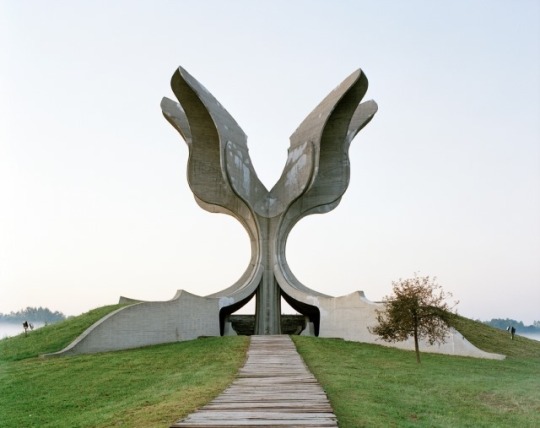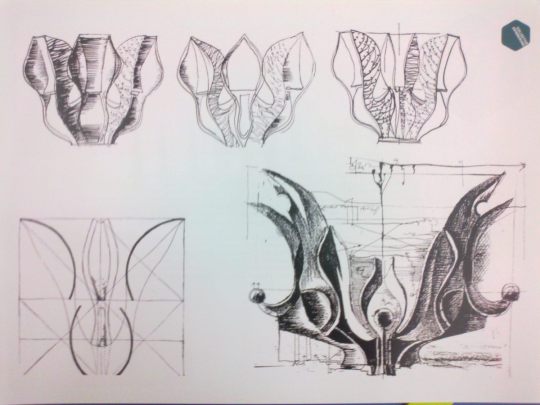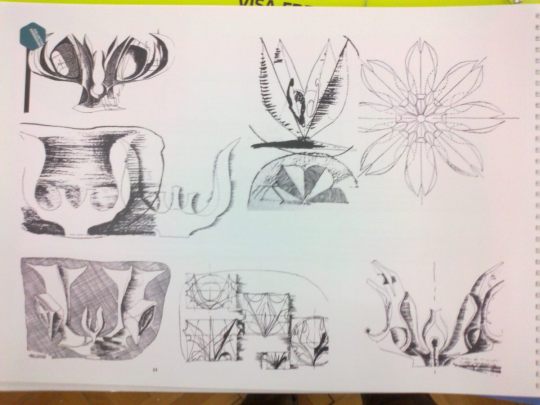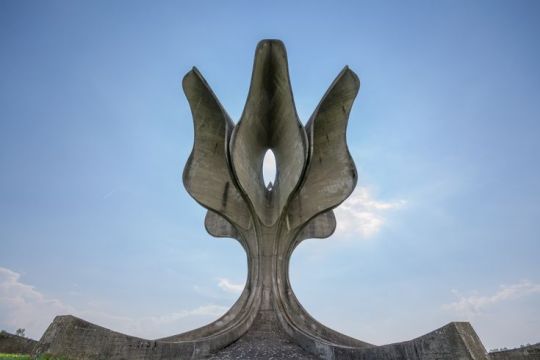#jasenovac
Photo
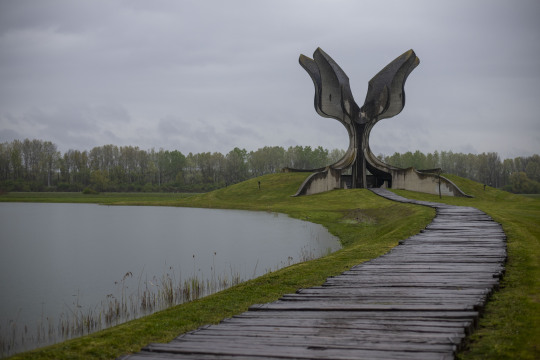
Kameni cvijet.
#stone flower#croatia#hrvatska#Камени цвет#jasenovac#spomenik#spomenikdatabase#lakeside#rainyday#concrete#concrete monument#travelphoto#travelling#travellingman#travelphotography#brutalism#brutalismarchitecture#canontop#canonphoto#emlékmű#beton#tó#eső
16 notes
·
View notes
Link
Unresolved atrocities
#Croatia#Ustache#Jasenovac#death camps#history#Nazi#fascism#barbarity#WWII#genocide#ethnic cleansing#eugenics#dehumanization
2 notes
·
View notes
Text
Odbrana vladike Ćulibrka: Ko manipuliše Jasenovcem?
Foto Igor Pavicevic
Zašto je polemika oko Jasenovca dalekosežno najvažnija koja se vodi u Srbiji
Piše: Dejan Jović (Nedeljnik)
Pravi – i sve oštriji, a donekle i bizarniji – “sukob na desnici” odvija se već nekoliko godina unutar Srpske pravoslavne crkve, kao i unutar historiografskih institucija i među nekim istoričarima, u vezi sa brojem žrtava u jasenovačkom logoru. Tema je, dakle, stara –…
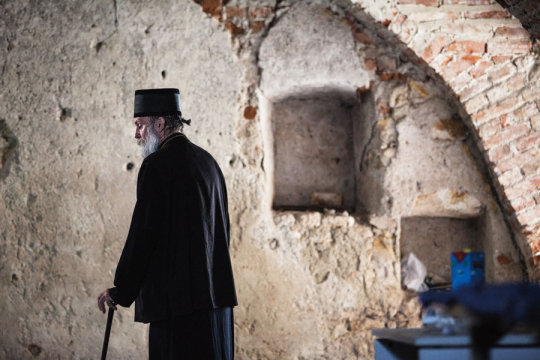
View On WordPress
0 notes
Text
Avdo Huseinović
Historijska je činjenica da su četnici i ustaše sarađivali u borbi protiv partizana, od 1942. godine pa nadalje. Jedna od najpoznatijih fotografija, koja svjedoči o ovoj saradnji, snimljena je u okolici Banja Luke 1942. godine. Na njoj, četnički vojvoda Uroš Drenović nazdravlja sa ustaškim oficirima, poslije sporazuma koji su sklopili nešto ranije.
Rahmetli akademik Muhamed…

View On WordPress
0 notes
Text
Plenković: Optužnica Srbije protiv pilota za Hrvatsku ne postoji
Plenković: Optužnica Srbije protiv pilota za Hrvatsku ne postoji
Hrvatski premijer Andrej Plenković izjavio je da optužnice iz Srbije protiv hrvatskih pilota zbog navodnih ratnih zločina u Domovinskom ratu za njih kao državu ne postoji, ukazujući da Srbija prvo mora da se suoči sa svojom prošlošću i ulogom iz devedesetih.
„Nadležnost Srbije u predmetima koji se tiču navodnih počinjenja krivičnih djela na teritorijima drugih država, od državljana drugih…

View On WordPress
0 notes
Text
Vučić se obrušio na hrvatske medije pa poručio: 'Ja ne želim ići na more u Hrvatsku. Ne zanima me to. Hoću ići u Jasenovac!'

Srbijanski predsjednik Aleksandar Vučić obraća se javnosti. Osim o sastavljanju srbijanske Vlade, govorit će i o posjetu Jasenovcu
Vučić prvo govori o konzultacijama o novom premijeru s predstavnicima stranaka u novom sazivu Skupštine Srbije, prenosi N1.
'Razgovarali smo i o problemima Hrvata u Srbiji i potencijalnom sudjelovanju u budućoj vladi', rekao je Vučić.
'Zadovoljan sam razgovorima, zadovoljan sam što se razumije težina situacije s kojom se suočavamo, ne našom krivicom. Ne mislimo isto, ali mogli smo razgovarati. To je dobro za srpsku demokraciju', dodao je.
Dotaknuo se teme energetike: 'Poduzeli smo mnogo mjera po pitanju rješavanja problema u energetici.'
Obrušio se na hrvatske medije
Vučić je rekao da informaciju o njegovom posjetu Jasenovcu nisu objavili srpski mediji, nego Jutarnji list. 'Oni su mislili da ćemo izaći u javnost iako to nije bio naš plan jer smo htjeli u tišini predati notu. Krenuli su u napad sa sumanutim argumentima. Zamislite vi taj kaos koji izazivate što ćete položiti cvijeće i zapaliti svijeću? Da to nazivate kaosom i nazivate provokacijom, nisam mogao vjerovati da će netko pokrenuti takvu kampanju. Onda s tim naslovom ide u svim medijima. Sve naslovne strane bez izuzetka u najgorem svjetlu govore i o meni i o Srbiji. To u Srbiji nije slučaj, ja sam ponosan na to', poručio je Vučić te pred srbijanskim novinarima mahao s naslovnicima hrvatskih novina.
Potom je govorio što se dogodilo. 'Prvi put kontaktiramo kabinet predsjednika vlade RH. Molili smo da 10. rujna posjetimo Jasenovac. U više navrata, i direktno i indirektno, mole nas da pomaknemo posjet zbog unutarnje-političke situacije. Nismo s tim izašli u javnost, tako se s partnerima rješavaju stvari. Nama je Hrvatska vrlo važna, imamo veliki rast i razmjene u ovog godini', rekao je Vučić.
Potom je rekao da su 1. ožujka 2022. ponovili zahtjev za posjetom, ali da je odbijen nakon dva dana.
'A onda je došao treći put, obavijestio sam Pupovca i rekao mu "kako god hoćeš, ako imaš potrebe da obavijestiš kabinet Plenkovića, onda to učini" i on je to očito učinio. Oni su Oluju nekako podsvjesno povezali s Jasenovcem. Ja nisam nikada, ali oni jesu. To više govori o njima nego o nama. Mi ćemo doći u Jasenovac i bit ćemo korektni. Obavijestit ćemo javnost da smo to učinili. Sramota je da 81 godinu nakon što je osnovan najstrašniji logor u Europi, da nijedan srpski predsjednik nije bio u Jasenovcu. Ja sam bio, ali nitko nije bio kao predsjednik', kazao je Vučić.
'U četvrtak 14. srpnja stigla je molba Plenkovića i Radmana da Vučić ne ide u Jasenovac – da su za posjet čuli neslužbeno. Rekao sam da samo želim položiti cvijet i onda smo dobili cijeli ovaj cirkus koji su napravili sami, bez da smo išta napravili. Moj grijeh je da sam htio ući u zemlju EU-a i položiti cvijet na mjesto gdje je desetine tisuća ubijenih u Jasenovcu, nelogičnoj je zabraniti sve to i govoriti o provokacijama', poručio je.
Kaže da nije htio slušati više o tome da nije dobro doba godine i da je samo htio položiti cvijet. 'To nije odlazak na more. Ja ne želim ići na more u Hrvatsku. Ne zanima me to. Hoću ići u Jasenovac', kaže Vučić .
'To je bio po monstruoznosti najveći logor na teritoriju Europe. Taj logor nikad nije bio oslobođen. Nikad nismo jasan odgovor dobili. Puno se čudno stvari događalo oko Jasenovca', kaže Vučić.
Upitao se kakve veze ima njegov posjet Jasenovcu s padom ukrajinskog zrakoplova s oružjem. 'Dogodila se tragična nesreća, to su bile mine za obuku. Što smo htjeli točno sakriti? Osim što netko mora da pronađe u Srbima krivca uvijek. Znam ja zašto sam ja njima kriv. Da sam na njihovom mjestu, isto bih se ponašao moguće, možda bih radio malo bolje razloge, a ne ovako tupave. Ali razumijem zašto me mrze', kazao je Vučić.
'Šutimo kad svugdje u EU pričate na summitima o velikosrpskoj agresiji. Sad smo shvatili da je Jasenovac zabranjeno mjesto, mi ćemo raditi na tome da u glavama srpske djece to ne bude zabranjeno mjesto. Bit će velike i sistemske promjene u našem prosvjetnom sustavu, ali ćemo ulagati sve više novca u nove filmove, serije, knjige, prevoditi na druge jezike, da svi mogu znati što se tu dogodilo', rekao je Vučić.
Kazao je da osim s Pupovcem nije komunicirao s nikim iz hrvatskih vlasti. 'Ne znam ni što bi razgovarali? Ja imam poštovanje prema njima, ali kada vam netko ovo napravi...ne znam što bi vam rekao. Ja da se nekome dodvoravam, neću dok sam živ. Ja da idem na more i da se kupam, neću. Ne mislim da ćemo se pomiriti, uvijek ćemo drugačije gledati na NDH i ono što se dogodilo 90-tih', kazao je.
Podsjetimo, predsjednik Srbije Aleksandar Vučić htio je u nedjelju mimo protokola privatno doći u Jasenovac i Pakrac o čemu je obavijestio saborskog zastupnika i predsjednika SDSS-a Milorada Pupovca koji je pak o tome obavijestio hrvatsku Vladu. Vučiću je posjet zabranjen, a ministar vanjskih i europskih poslova Gordan Grlić Radman kaže kako to nije "odlazak na more" te kako se procedura i protokol u takvim situacijama, pogotovo kad je riječ o predsjedniku koji je štićena osoba, moraju poštivati.
Tportal.hr
Read the full article
0 notes
Text
Radovi u sred turističke sezone: Zatvara se saobraćaj na Graničnom prelazu Jasenovac
Preko Graničnog prelaza Jasenovac u Kozarskoj Dubici / Bosanska Dubica od ponedjeljka će biti zatvoren saobraćaj za sva vozila.
Razlog je rekonstrukcija magistralnog put M-I 100, tačnije dionica Draksenići Donja Gradina – Jasenovac,
Ministarstvo saobraćaja i veza Republike Srpske odobrilo je obustavu saobraćaja za sva vozila na ovoj dionici od 18. jula do 31. jula, odnosno 14 dana.
Ovo zatvaranje…

View On WordPress
0 notes
Text
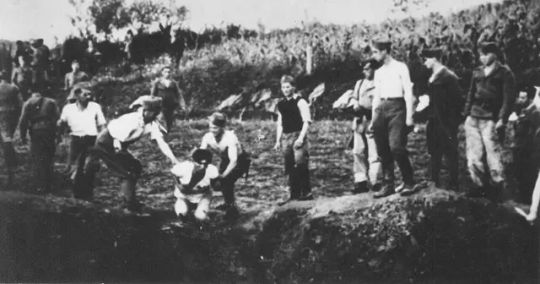
The Croatian fascist Ustaše militia prepare to execute prisoners near the Jasenovac concentration camp.
26 notes
·
View notes
Text
THIS DAY IN GAY HISTORY
based on: The White Crane Institute's 'Gay Wisdom', Gay Birthdays, Gay For Today, Famous GLBT, glbt-Gay Encylopedia, Today in Gay History, Wikipedia, and more … January 5

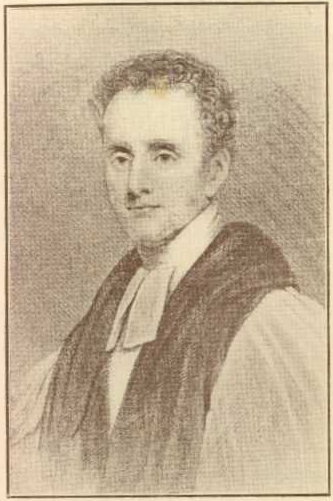
1773 – Richard Heber (d.1833) was an English book-collector.
A taste for book collecting was developed in him in childhood. As an undergraduate, he began to collect a purely classical library, but his taste broadening, he became interested in early English drama and literature, and began his wonderful collection of rare books in these departments. Succeeding on the death of his father in 1804 to large estates in Yorkshire and Shropshire, which he considerably augmented, he forthwith devoted himself to the purchase of rare books. Heber was one of the 18 founders in 1812 of the Roxburghe Club of bibliophiles.
He possessed extensive landed property in Shropshire and Yorkshire, and was High Sheriff of the former county in 1821, was Member of Parliament (MP) for Oxford University from 1821 to 1826, and in 1822 was made a D.C.L. of that University. He was one of the founders of the Athenaeum Club, London.After ransacking England for books, Heber travelled extensively on the Continent, purchasing everywhere, and leaving large depots of books in Paris, Antwerp, Brussels, Ghent, and elsewhere in the Netherlands and Germany. At booksales he sometimes purchased single volumes, sometimes whole libraries. Sir Walter Scott classed Heber's library as "superior to all others in the world." He did not confine himself to the purchase of a single copy of a work which took his fancy. "No gentleman," he remarked, "can be without three copies of a book, one for show, one for use, and one for borrowers." To such a size did his library grow that it overran eight houses, some in England, some on the Continent.
In 1826 he and Charles Henry Hartshorne, a friend he had made through the Roxburghe Club, encountered gossip and innuendo over the nature of their relationship. John Bull magazine hinted in two of its issues that it was homosexual. Heber abruptly left the country; Hartshorne sued John Bull successfully in the courts.
At his death his collection in England was estimated by at 105,000 volumes, exclusive of many thousands on the Continent, the whole having cost more than £180,000. This immense library was disposed of by auction after the owner's death, the sale lasting 216 days and realizing more than £60,000.
After he died the well-founded gossip that he had been homosexual resurfaced.


1907 – Rod Riffler, born Rudolf Ungar, (d.1941) was a Croatian modern dance teacher, choreographer and owner of a dance school in Zagreb, who was killed during the Holocaust.
Riffler was born in Osijek to a Jewish parents, Makso and Ilka (née Lang) Ungar. His father was a merchant born in Osijek. Riffler was raised with two siters, Marie Louise and Marija, and younger brother, Rafael. When he moved from Osijek to Zagreb, Riffler opened a dance school and was one of the best teachers of modern dance at the time.
Riffler was mentor and teacher of Lea Deutsch, the well-known Croatian Jewish child actress. He was also a close friend of Deutsch's mother, Ivka.
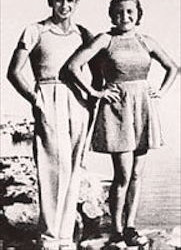
Riffler was homosexual. In 1941, when the Ustaše (Croatian Fascists) found out that he was a Jew and homosexual, Riffler was arrested and deported to Jasenovac concentration camp. Riffler died from hunger in the Jasenovac concentration camp. He was 34 years old.
In 2010 Croatian director Branko Ivanda made a film "Lea i Darija - Dječje carstvo" (Lea and Darija - Children's Empire), about the tragic destiny of Lea Deutsch, who died while being shipped to Auscwitz. Rod Riffler was portrayed in the movie by Croatian actor Radovan Ruždjak.


1931 – Alvin Ailey, Jr. (d.1989) was an American choreographer and activist who founded the Alvin Ailey American Dance Theater in New York. Ailey is credited with popularizing modern dance and revolutionizing African-American participation in 20th century concert dance. His company gained the nickname "Cultural Ambassador to the World" because of its extensive international touring. Ailey's choreographic masterpiece Revelations is believed to be the best-known and most often seen modern dance performance.
Ailey was born to his 17-year-old mother, Lula Elizabeth Ailey, in Rogers, Texas. His father abandoned the family when Alvin was only 6 months old. Like many African-Americans living in Texas during the Great Depression, Ailey and his mother moved very often and she had a hard time finding work. Ailey grew up during a time of racial segregation and rumors of violence and lynchings against African-Americans. When Ailey was five, his 22-year-old mother was raped by a group of white men, leaving him afraid of whites. Early experiences in the Southern Baptist church and jook joints instilled in him a fierce sense of black pride that would later figure prominently in Ailey's signature works.
In the fall of 1942, Ailey's mother, like many African Americans, migrated to Los Angeles, California where she had heard there was lucrative work supporting the war effort. Ailey joined his mother later by train, having stayed behind in Texas to finish out the school year. Ailey's first junior high school in California was located in a primarily white school district. As one of the only black students, Ailey felt out of place because of his fear of whites, so the Aileys moved to a predominantly black school district.
Ailey did not become serious about dance until in 1949 his school friend Carmen De Lavallade introduced him to the Hollywood studio of Lester Horton. Horton would prove to be Ailey's major influence, becoming a mentor and giving him both a technique and a foundation with which to grow artistically.
When Horton died in November 1953 the tragedy left the company without an artistic director. The company had outstanding contracts that required and desired new works. When no one else stepped forward, Ailey assumed the role of artistic director. Despite his youth and lack of experience (Ailey was only twenty-two and had choreographed only one dance in a workshop) he began choreographing, directing scene and costume designs, and running rehearsal. Not finding another mentor, he began creating works of his own.
Ailey formed his own group, Alvin Ailey American Dance Theater, in 1958. The group presented its inaugural concert on March 30, 1958. Notable early work included Blues Suite, a piece deriving from blues songs. Ailey's choreography was a dynamic and vibrant mix growing out of his previous training in ballet, modern dance, jazz, and African dance techniques. Ailey insisted upon a complete theatrical experience, including costumes, lighting, and make-up. A work of intense emotional appeal expressing the pain and anger of African Americans, Blues Suite was an instant success and defined Ailey's style.
For his signature work, Revelations, Ailey drew upon his "blood memories" of Texas, the blues, spirituals, and gospel. These forces resulted in the creation of his most popular and critically acclaimed work. Ailey originally intended the dance to be the second part of a larger, evening-length survey of African-American music which he began with Blues Suite.
Ailey was openly gay and is one of the most prominent gay Black men in American history. According to Black gay activist Keith Boykin, this is rarely acknowledged in the Black community due to the stigma surrounding homosexuality. For a time during the 1950s, Ailey was romantically linked with political activist David McReynolds. Ailey died in 1989 at the age of 58. To spare his mother the social stigma of his death from AIDS, he asked his doctor to announce that he had died of terminal blood dyscrasia

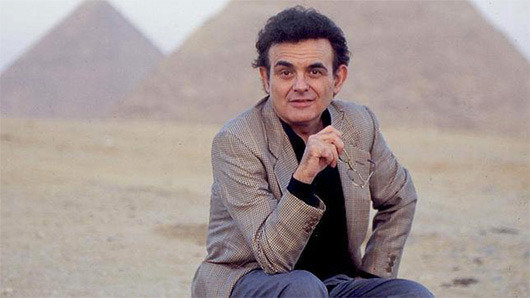
1942 – The Spanish novelist Terenci Moix had a fascination for the ordinary combined with beautifully wrought language, and a love of good living, honed by lonely hours struggling for literary perfection. His Onades sobre una roca deserta, (Waves On A Desolate Rock) won the 1968 Pla prize.
The following year, he published El dia que va morir Marilyn (The Day That Marilyn Died), which became the talisman-book of his generation. This famous novel follows two Barcelona families from before the Spanish civil war to the new freedoms of the 1960s.
Moix was born to a lower middle-class family in Barcelona's old city, and christened Ramon. In the bitter years after the civil war, he grew up in the Plaza del Peso de la Paja (straw-weighing square). El peso de la paja also means the "weight of wanking" – the sort of double entendre that Moix adored – and, in the 1990s, became the title of his three-volume autobiography.
He left school at 14, and fled from his parents' rows to live for several years in Paris, London and Rome. Abroad, he met 1960s pop culture, which reaffirmed the value of the world of films he had escaped into as a child. He became, too, a man of formidable knowledge and culture – a linguist, an opera-lover and an Egyptologist.
Moix chose early to live his life as freely as possible. He returned to Barcelona in the mid-1960s to become openly (and illegally) homosexual, irreverently exhibitionist, scandalous and obscenely witty. Some say he named himself Terenci after the young Terence Stamp.
In 1986, he won the Planeta prize with No digas que fue un sueño (Don't Say It Was A Dream), a reworking of the story of Antony and Cleopatra. This sold more than a million copies, and brought him mass popularity. It is a book of lyrical, rich language, peppered with mordant darts of irony and laughing vulgarity.
Four more novels on ancient Egypt followed, culminating in El arpista ciego (The Blind Harpist, 2002). He was wont to say, with a rich camp chuckle, that he had been left by seven lovers, so took refuge in frequent visits to Egypt – first in the 1960s – and a vast collection of videos. Egypt and films were the loves that never betrayed him.
Moix lived life on his own terms. Transgressing society's norms, he found that masses of people ended up loving him for his freedom and integrity. His best books are landmarks in modern Spanish literature.
He died in 2003 aged 61 from emphysema.


1943 – On this date the famed Dutch soccer referee Ignace Van Swieten was born (d. 2005), He was born in a Japanese POW camp near Semarang in Indonesia, a Dutch colony at the time.
Van Swieten was openly Gay at a time when it was not accepted in professional sports. Hell it's still tough. According to a 2009 poll conducted by the Dutch football magazine, Magazine Voetbal International, 33% of professional football players in the Dutch league expressed the notion that if a footballer came out of the closet, he wouldn't have a life anymore. Twenty-five percent believe that homosexuality will always be a taboo. Sixty percent feel that there is no place for homosexuals in Dutch football. Only eleven players said that they do not consider it a taboo anymore.
Van Swieten received a lot of hatred from players and fans alike, including an attack with a hammer, but is now considered a great figure in Dutch Football and a valued teacher to other players. He was also a teacher at the KNVB Academy, the Educational Department of the Royal Netherlands Football Association. He died of lung disease in 2005.


1965 – Robert Beachy, born in Aibonito, Puerto Rico, is associate professor of history at Underwood International College at Yonsei University in Seoul, South Korea. He formerly taught at Goucher College in Baltimore, Maryland. He received his Ph.D. from the University of Chicago in 1998. Beachy specializes in the intellectual and cultural history of Germany and Europe, and is known for his work on the history of sexuality in the Weimar Republic, under the Nazis, and in Germany after the Second World War.
In 2009, Beachy was named a fellow of the John Simon Guggenheim Memorial Foundation for his research on homosexuality in Nazi Germany. Beachy's work also has received support from the Huntington Library, the National Humanities Center, the Max Planck Institute for History, the Herzog August Bibliothek in Wolfenbüttel, the German Academic Exchange Service (DAAD) and the American Philosophical Society.
In 2015, his work "Gay Berlin: Birthplace of a Modern Identity" was named a Stonewall Honor Book in Non-Fiction by the American Library Association.


1984 – Ryan O'Meara, born in Houston, Texas, is an American ice dancer. With partner Jamie Silverstein, he is a 2006 Olympian. Following his retirement from competitive skating, he began working full-time as a coach and an interior designer.
O'Meara competed on the novice and junior levels with Melissa Ralph and Lia Nitake, having some success with them both. He won four straight medals at the U.S. Championships on the novice and junior levels between 1999 and 2002, two with Ralph and two with Nitake. He competed with Lydia Manon from 2003 to 2005. With Manon, he won the bronze medal at the 2005 U.S. Championships and at the 2005 Four Continents, following which Manon decided to end the partnership.
He began training with Jamie Silverstein, a former World Junior Champion with Justin Pekarek, in April 2005. They were coached by Igor Shpilband and Marina Zueva in Canton, Michigan. Silverstein and O'Meara had sudden success. They were sent as a host entry to the 2005 Skate America, their first international competition together as a team, and placed 5th.
They won the bronze medal at the 2006 U.S. Championships, which qualified them for the 2006 Winter Olympics and the 2006 Four Continents Championships. They competed at the Four Continents and placed 6th.
At the Olympics, they placed 18th in the compulsory dance, 16th in the original dance, and 18th in the free dance, placing 16th overall out of 23 teams. They chose not to compete at the 2006 World Championships. U.S. pewter medalists Morgan Matthews and Maxim Zavozin were sent in their place.
In the spring of 2006, Silverstein and O'Meara announced they would be taking time off from competitive skating. Their partnership ended soon after and O'Meara retired from competitive skating.
O'Meara works as a coach. He owns an interior design business called "Palavela Home", which is named after the Palavela, the venue for the figure skating competition at the Olympics. O'Meara is openly gay

1988 – Raleigh, North Carolina enacts a gay rights ordinance. Raleigh is the hometown of the famous homophobe Jesse Helms.


9 notes
·
View notes
Text

The Jasenovac concentration camp was located at former brickworks in the town of Jasenovac in Slavonia, northeast Croatia. The Jasenovac monument commemorates the reportedly 100,000 mostly Serbs, Jews and Gypsies who were killed at the World War II concentration camp.
Designed by renowned architect and academic Bogdan Bogdanović and built in 1966, the colossal concrete sculpture is also known as ‘Stone Flower’. Jasenovac gained international attention due to the brutality inflicted at concentration camp. One of the most barbaric death camps in Europe, Jasenovac came to be known as the Auschwitz of The Balkans. Photo by Jan Kempenaers.
8 notes
·
View notes
Text
Fascism in Croatia
I want to write about today's problem, but it is impossible without explaining the roots.
When the first Yugoslavia was established under the serbian king, serbs wanted to persuade croats, slovenes, and other ethnicities to become serbs. That was mostly performed on polite way, but sometimes with oppresion, even brutal. As a revolt, terrorist organisation "ustaše" ("rebels") was established. After some time they found refuge in Hungary and Mussolini's Italy.
When IIWW started, Hitler and Mussolini put that terroristi organisation on power in Croatia, establishing so called Independent state of Croatia on the territory of today's Croatia and Bosnia and Herzegovina. Nobody in Croatia voted for thair government. Newborn state immediately started with ethnic cleansing of their territory. They killed about 300.000 people who mostly didn't resist, as they didn't understand why should anybody have anything against them.
About 50.000 croats joined ustaša army on the begining of the war, as volunteers. Croats who were against the terror joined Tito's partizans. On the begining of the war was rather small number of partizans, but the movement grow during time to 500.000 soldiers on the end of the war + 305.000 fallen in battles. So total is about 800.000, and about 300.000 of them were croats. Uncommitted croats were mostly mobilised to regular army, domobrani (homeprotectors). They actually didn't want to fight, and were an easy target for partisans, and the main souce of weapon and personel.
On the end of the war, ustaše run to Austria to surrender to british forces, but after surrending they were relinquished to partizans and during next month liquidated in norther Slovenia, near the austrian border.
In todays Croatia about 30% of people consider ustašas as heroes, and partisans as bandits. Many so called historians want to falsificate the history, deny any war crime done by ustašas, and exaggerate number of liquidated ustašas to enorm unrealistic numbers. And all that goes without any punishment from the government.
Ustaša's slogan is in common and free use, even is officialy forbiden. Ustaša's songs are sang by paramilitary soldiers (HOS) every year on the date of liberation of croatian occupated territories from yugoslav army in 1995. in Knin. All members of that paramilitary group have T-shirts with that slogan and wear it on all official celebrations. Well, their excuse is that the slogan is older then IIWW and it is not connected with ustašas. But uniforms of that palamiritary organisation are exactly the same like ustaša's. And songs.
I lived in Zagreb till some one and half year. At least every three months I heard in some of Zagreb's caffe bars the following song, on jubox or sang by visitors:
"Jasenovac and Gradiška Stara, that is house of Maks's butchers"
Jasenovac was a concentration camp where manager was Maks Luburić, and there were killed about 100.000 people, mostly by slaughtering by special knives ergonomically adjusted for easier work.
The song goes further:
"In Čapljina (place in Bosnia) was slaughterhouse, many serbs Neretva (river) carried. Hey Neretva, flow near the coast, carry serbs to blue Adriatic."
On the end of the song guys said: "We are not embarresed to say that we are croats". I said to waiter that I am embarresed to be croat when listening them to sing such song. After a few days I found my car with broken windows.
Once when I heard that song in caffe bar I called the police. They came and made a lot of problems ... to me.
So, probably Putin would have a lot of job in Croatia, to solve the problem of "nazism", like he is doing in Ukraine as he said. But that is not realistic scenario, as that extremists in Criatia actualy adore Trump and Putin and want russian military base to be build on Adriatic coast. My opinion is that FSB work in Croatia, search for such morons, encourage them, and take care that nobody stop them. The goal is probably to take control over croatian seaside, as a strategic important point.
17 notes
·
View notes
Link
Never forget
#history#Croatia#Ustashe#Nazi#war crimes#genocide#barbarity#atrocities#Jasenovac#death camps#Catholic#ratlines#impunity#Argentina
0 notes
Text
Staro Sajmište: Politika rušenja i istorijski revizionizam
Rušenje bivšeg koncentracionog logora Staro Sajmište u Beogradu praćeno je fabrikovanjem istorije koja ometa istinsko sećanje i odavanje počasti žrtvama
Piše: Philine Bickhardt
Uprkos velikom broju izraza neslaganja u medijima u posle dnjih nekoliko dana i nedelja, radovi na rušenju se nastavljaju na mestu bivšeg nemačkog koncentracionog logora Staro Sajmište.
Rušenje Nemačkog paviljona i…
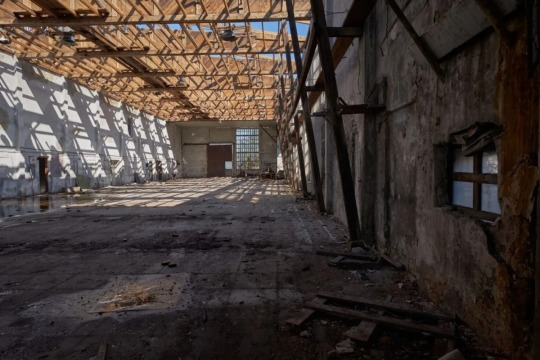
View On WordPress
0 notes
Text
Nema natjecanja među žrtvama
Nema natjecanja među žrtvama
Nenad Jovanović
Spomenik Dušana Džamonje u Jošanima u Lici, gdje su ustaše 1942. ubile 338 mještana, i dalje stoji razbijen, a u obližnjoj Udbini se obilježava komemoracija pripadnicima ustaškog pokreta, kazao je povjesničar Milan Radanović.
Sve žrtve holokausta su ravnopravne i oni koji ih predstavljaju, moraju nastupati zajednički prema vlastima koje izbjegavaju njihovo komemoriranje, pa i…
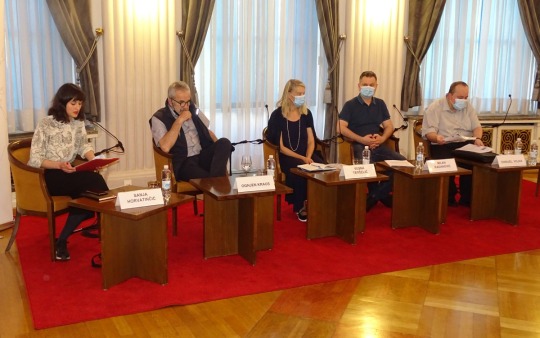
View On WordPress
0 notes
Text
"Hoću u Jasenovac, zašto mi ne date?"
“Hoću u Jasenovac, zašto mi ne date?”
Predsjednik Srbije Aleksandar Vučić danas je, povodom pisanja hrvatskih medija, rekao da nije on “otvorio Oluju”, već da Tužilaštvo za ratne zločine želi da se pronađu ubice s Petrovačke ceste.
Upitao je i kome on smeta u Hrvatskoj i zašto mu se ne dozvoli posjeta Jasenovcu.
“Kome smetam, jesam li rekao neku ružnu riječ o bilo kome? Svi svojim putem, ali nemojte mene tjerati, ja neću na more –…

View On WordPress
0 notes
